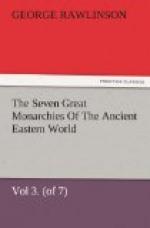The modern Persian is a very degenerate representative of the ancient Arian stock. Slight and supple in person, with quick, glancing eyes, delicate features, and a vivacious manner, he lacks the dignity and strength, the calm repose and simple grace of the race from which he is sprung, Fourteen centuries of subjection to despotic sway have left their stamp upon his countenance and his frame, which, though still retaining some traces of the original type, have been sadly weakened and lowered by so long a term of subservience. Probably the wild Kurd or Lur of the present day more nearly corresponds in physique to the ancient Mede than do the softer inhabitants of the great plateau.
Among the moral characteristics of the Medes the one most obvious is their bravery. “Pugnatrix natio et formidanda,” says Ammianus Marcellinus in the fourth century of our era, summing up in a few words the general judgment of Antiquity. Originally equal, if not superior, to their close kindred, the Persians, they were throughout the whole period of Persian supremacy only second to them in courage and warlike qualities. Mardonius, when allowed to take his choice out of the entire host of Xerxes, selected the Median troops in immediate succession to the Persians. Similarly, when the time for battle came he kept the Medes near himself, giving them their place in the line close to that of the Persian contingent. It was no doubt on account of their valor, as Diodorus suggests, that the Medes were chosen to make the first attack upon the Greek position at Thermopylae, where, though unsuccessful, they evidently showed abundant courage. In the earlier times, before riches and luxury had eaten out the strength of the race, their valor and military prowess must have been even more conspicuous. It was then especially that Media deserved to be called, as she is in Scripture, “the mighty one of the heathen”—“the terrible of the nations.”
Her valor, undoubtedly, was of the merciless kind. There was no tenderness, no hesitancy about it. Not only did her armies “dash to pieces” the fighting men of the nations opposed to her, allowing apparently no quarter, but the women and the children suffered indignities and cruelties at the hands of her savage warriors, which the pen unwillingly records. The Median conquests were accompanied by the worst atrocities which lust and hate combined are wont to commit when they obtain their full swing. Neither the virtue of women nor the innocence of children were a protection to them. The infant was slain before the very eye of the parent. The sanctity of the hearth was invaded, and the matron ravished beneath her own roof-tree. Spoil, it would seem, was disregarded in comparison with insult and vengeance; and the brutal soldiery cared little either for silver or gold, provided they could indulge freely in that thirst for blood which man shares with the hyena and the tiger.




